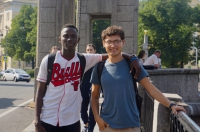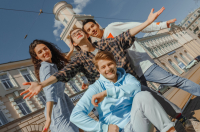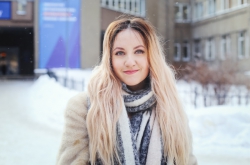Hi, Niki! Can you tell us why you decided to spend your exchange semester in Russia? Why ITMO University in particular?
My major is international business and I would like to become an entrepreneur. ITMO University is a partner of my home university, which is how I learned about this opportunity to go to St. Petersburg. I was warned that the course I'm going to take focuses on computer science, but also has a significant business aspect, which I need. Moreover, Russia has always been a very important business partner for Finland - trade between our countries has been going on for many years. The idea of going to Russia attracted me, as I am interested in the Russian language and culture as well as in the Russian lifestyle. This knowledge and “hands-on” experience will come to my advantage in the future, when I start looking for a job in Finland. It is important to understand that in-depth knowledge of key business partners, their language and culture is very much appreciated. Nowadays, it is very rare for people in Finland to know even the basics of the Russian language and but a few facts about their big neighbour.
So you have already started learning Russian?
I started learning Russian in Finland about eighteen months ago. I continue my studies here, as it would be foolish not to use this opportunity. My Russian, unfortunately, is not good enough to answer your questions, but I am good at small talk: for example, ordering food at a restaurant or asking the way on the street.

How long have you been in St. Petersburg? What was the biggest difficulty for you when you first came here?
I came to St. Petersburg about a month and a half ago, at the start of the semester. The first problem I had to face was that most people here don’t speak English, so it was, and sometimes still is, difficult to communicate. I have also had problems with red tape when I was applying for a subway student pass. No one knew how long the whole process would take, which resulted in certain difficulties. I cannot say, though, that these complications have been a huge nuisance, it is just that the whole system is very different from the one I am used to.
What are the core differences between the educational systems in Russia and Finland?
At my home university, tutors and teachers do not “teach” in the traditional sense of the word; they often consult and guide you, whereas here there is a more traditional approach, the professors often go into the fundamentals and theory. In Finland, we often work on projects, and the system encourages self-study; we seldom have direct answers and rigid instructions. This approach has both advantages and disadvantages. For instance, if I couldn’t understand something, I may never get a chance to, and the traditional system in Russia presents you with the right answers, although sometimes it does not provide you with that much space for your own research and thinking.
Have you ever studied abroad, or is it your first international exchange experience?
I did work as an apprentice in Germany, but that was only for three weeks – not your usual full-scale academic experience, so I can’t really comment on the educational system in Germany. It seems that Russia is my first true experience of studying abroad.

Tell us about your life in St. Petersburg. How different is it compared to your everyday life in Finland?
I live in an apartment that I rented on Airbnb. I live with my girlfriend, who has come here with me from Finland. She has recently got her Bachelor’s in Social Sciences. I have to admit, my life here is completely different from my life in Finland. For example, I always eat out and never cook at home. It is cheaper that way, besides I can call wine and beer tasting a sort of a hobby.
Do you have any friends here in Russia?
I have several tutors in Finland who advise me on different topics. Here I also have a tutor, Eleanor, who helps me with everything, she’s a friend, too. We are also quite close with a few of my classmates, sometimes we spend time together.
What do you do on weekends?
I usually go to restaurants, because I like good food. I notice that I tend to go to expensive places in St. Petersburg more often than in Finland. In Oulu I also frequented the gym, even when I was quite busy. I do that, here, too, but mostly because there is more free time. I don’t watch Russian TV, because I don’t understand any of it.. Finnish students like going to bars to party and cause ruckus, but not me. I’d rather sit quietly and savour this time without all that noise.

Do you already have any favourite spots in the city?
I do not have any specific favourites, but I am fond of the architecture. There are not so many beautiful historic buildings in Finland, so in St. Petersburg I can roam the city for hours, enjoying the parks, buildings and rivers. These walks are really one of my favourite pastimes here. I would say that the entire historical center of the city is my favourite spot.
If your groupmates in Finland were to ask you about studying here, what would you tell them? What tips would you give them?
I'd surely tell them that it's worth the trip. Many students in Finland tend to go to Spain, Vietnam or Germany. I can say that, despite being close to Russia, many Finns have a very distorted view of the country, which is mostly based on stereotypes. My mother used to visit Russia a lot and gave me a clear understanding of the country, so I have no such prejudices. Many of my compatriots believe in shallow stereotypes that would be easily dispelled if they saw everything for themselves. Life in Russia is not that different from the life of a European. Many still think of the 1990s when they talk about Russia and that, of course, was a very difficult time for the country. I can assure you everything is different now from how it was 20 years ago.
What are the most popular stereotypes, apart from bears and vodka?

One of the common misconceptions is about trust - many believe that you shouldn’t trust a Russian. Also, you often hear that there is a lot of criminal activity in Russia and it is not as safe as in Europe. For example, when I was leaving for Russia, my relatives were worried that I would constantly be in danger. It seems funny when you actually see things as they are. I’ve been to many cities in Europe and I am convinced St. Petersburg is one of the safest places; safer than, say, Berlin.
I know that you’ve recently starred in a film about the Winter War. Tell us about this experience. How did you end up part of the cast?
It was one of the most exciting parts of my life, and a real surprise. I still cannot believe that I really helped make a movie.
One fine morning Asko, another Finnish exchange student, and I got a message that some people were looking for two Finns for a movie shoot. I said yes without hesitation. History is one of my favourite subjects, so it was especially exciting and pleasant for me to be in a historical film. We worked on a short documentary about the Winter War of 1939. I am amazed that many people know nothing about it. This was another reason why I wanted to take part in the project: to make others more aware of those tragic times.

Where did the shoot take place? Which part did you play?
We went to the forests of Karelia to a location where the Soviet and Finnish armies actually fought. The idea was unusual - we shot the last five minutes of this war, that is, the film is supposed to tell us what happened in these five minutes before the war ended. We even shot several scenes with live artillery. I played the part of a Finnish captain. Asko and I were needed to make the Finns as authentic as possible. In my scene, I shake hands with Soviet soldiers and ask the Soviet captain if we can go over to the side of the former enemy to gather the bodies of our dead soldiers. Then there is a scene in which the Soviet and Finnish troops meet and exchange cigarettes. It was an unforgettable experience. The whole film is no longer than five to seven minutes, and my part lasts about two minutes. I do not know the official name of the film, but I know that it will be presented at the exhibition "Winter War" in the Vyborg museum. The video will also be available on YouTube.
Translated by Pavel Vorobyev



